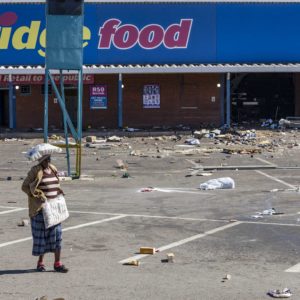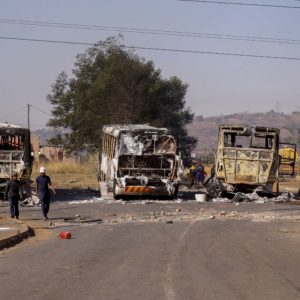A moment of rupture
There can be no return to business as usual after the rapidly mutating rupture in recent days. What happens in the months and years to come is of critical import.
Author:
13 July 2021

S’bu Zikode, leader of Abahlali baseMjondolo, the largest movement of impoverished people to have emerged after apartheid, warned in 2008 that the “anger of the poor can go in many directions”. He was right. Not long after he first made this statement, migrants and ethnic minorities were attacked, driven from their homes and murdered in various parts of the country.
Zikode has not been the only person to issue this kind of warning. Year after year, grassroots activists have warned that something will snap. The state and middle-class society have been largely indifferent to these warnings and, indeed, to the suffering of millions of people who must survive without work or a viable income, without decent homes, and without being able to meet a need as urgent and as basic as food.
There is also a generalised indifference to the increasing violence with which impoverished people are ruled. People have been regularly killed by the police in street protests, during evictions and disconnections, and activists assassinated, without any sense of there being a general social crisis.
Related article:
There has been a common tendency to understand the ways in which impoverished people make their lives and express their demands as consequent to criminality rather than material and political conditions. This lens always works to compound the social crisis. The oppressed are taken as a threat to be excluded, controlled and disciplined, rather than as fellow citizens – or even fellow human beings – who are suffering as a consequence of grievous injustice and with whom a viable and shared future must be constructed.
Just over a month ago, as new unemployment statistics showed that just less than 75% of young people were without work, New Frame warned that “South Africa is not a viable society for a large proportion of the people who live here, and if history is a reliable guide to the future, something will have to give”. That moment has arrived.
Clear vision
It is imperative to understand clearly the project that has cohered around Jacob Zuma. It is the contemporary expression of a long-standing form of authoritarian and ethnically organised reaction against the democratic and progressive politics that began to emerge in Durban in the late 1960s and early 1970s and mobilised millions across the country during the 1980s. It is a predatory and violent politics, a reckless politics entirely willing to incite xenophobic and ethnic hostilities. It pursues elite accumulation at the direct expense of the majority and cynically misrepresents this, through the trickle-down fantasies cultivated by every prosperity cult, as being in the interests of the people as a whole.
After Zuma handed himself over to the prison in Estcourt, KwaZulu-Natal, trucks were attacked and burnt on the N3 in a manner that repeated key elements of previous forms of xenophobic violence. The escalation of the impunity long awarded the violent posture and thuggery of Zuma’s supporters in the ANC tore enough of a hole in the social order for huge numbers of people, operating without any centralised organisation or expressed political programme, to begin appropriating food on a massive scale. Many people close to the riots have said that participants were clear that “this is not about Zuma, it is about our stomachs”.
Related article:
As the food riots, initially marked by a carnival atmosphere in some places, turned into wider forms of appropriation and destruction, and simple opportunism in which many well-off people participated, things rapidly worsened. In some areas, known and feared criminals, often with connections to local ANC politics and associated business interests, entered the tumult.
Terrible things have happened. Lives have been lost, livelihoods destroyed, the long cycle of social trauma escalated and all kinds of existing social fractures rapidly widened as, with the police largely absent, people gathered to organise their own security.
Yesterday we saw the rapid widening of all kinds of lines of rupture and antagonism in society. Grassroots activists expressed great concern that popular anger could turn against migrants or ethnic, racial and even religious minorities. A leading activist, himself umZulu, expressed alarm about what he termed a desire for “Zulu supremacy”. Another leading activist, seeing shopkeepers identified as migrants, Indians and as Muslims organising to protect their businesses, expressed equally serious concern about the possibility of escalating hostility and violence. All this was exacerbated by vigilantism, some of it deeply racialised.
Democracy for all
As yesterday’s events unfolded, mutating by the hour, acts of violence and opportunism swiftly and understandably attained hypervisibility, with images of well-off people helping themselves to luxury goods inspiring widespread revulsion. The wider public has largely been shown a version of the unfolding events through the eyes of the professional and middle classes. The riots have seldom been shown through the eyes of people who may live in or near to a suburb but are not deemed “residents”, people now reduced to an undifferentiated, threatening and criminal mob, many of whom are deeply fearful and concerned about what is happening.
Related article:
The image of a man struggling to load a large television into his car in Pietermaritzburg reflects a part of the reality of what is happening. But a full understanding requires that attention is also given to people who must put their children to bed without food, who cannot find work or a means to a viable life, and whose impoverishment frequently renders them criminal in the eyes of the state and middle-class society. We cannot build a viable society in which everyone has a stake and everyone is safe if we do not take everyone’s lives and wellbeing seriously. Democracy has no future if it is not for everyone.
In a situation like this it is often necessary to hold two or more thoughts simultaneously. People have been hungry for a long time, and when the opportunity came they appropriated food. This act turned a private crisis, often endured in families or small networks, into a general and public one. It is possible that this could prompt a wider awareness of the social crisis, including the question of hunger, and some pressure to address it. But at the same time, as the riots took new forms, they did massive damage to people and the material and social infrastructure of some of our towns and cities. They will not easily recover and the damage will, like every disaster, hit the most vulnerable first and hardest. Both points are simultaneously true.

So many tragedies
If there is a literary lens to make sense of what is happening, it is tragedy: that people were left to suffer for so long; that this suffering has been radically compounded by the Covid-19 crisis; that the politics that cohered around Zuma was given impunity for so long; that there were no forms of progressive organisation with the reach and power to organise for justice on a sufficient scale or to speak to the rebellion with sufficient standing and influence; and that when the long-expected moment of rupture happened it morphed, as everyone feared, into such destruction.
That tragedy is continuing. As the riots continue, they are becoming more ruinous. There is now a much harder edge and a growing nihilism is increasingly intersecting with local forms of criminality and attempts at ethnic mobilisation. Everyone is at some sort of risk. Everyday life is now lived in a constant awareness of possible danger. An ubiquitous fear and anxiety exist. Food supplies are running down. Social tensions are escalating at an alarming velocity. This is not over.
Related article:
It will take months, perhaps even years, to start to get an adequate understanding of what has happened. Indeed, these days will still be discussed and debated 100 years from now. The imperative to make sense of what has happened is urgent. The question of what happens in the days to come is also critical. But the question of what comes next, in the months and years to come, is also vital.
There are all kinds of possibilities, many of them grim. Our best chance of a way into a viable future is the construction of a democratic popular politics at significant scale, a politics that speaks directly to people’s lived experiences and is owned and directed by the oppressed – what Zikode first called “a living politics”. Now is the time, more than anything else, for a politics committed to equality, dignity and safety for all. Our collective future depends on it.




